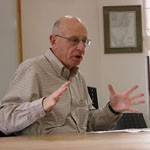
JERUSALEM — Confusion prevails in the government. And has been joined by multiple protests and strikes.
Several are protests by the ultra-Orthodox, against closures in their neighborhoods or towns.
Others are protests against economic issues, demanding more money for those in the street.
Others are more focused against the Prime Minister, demanding his resignation, and massing in front of or near his home.
There’s a mixture among all of these, with some demanding the Prime Minister’s resignation, and various elements throwing stones, setting fires to dumpsters, breaking into stores, taking what they can, and tussling with the police.
Most violent was a strike that began near the Prime Minister’s home, then moved to the center of town. The police coped with horses and water canons, and a great deal of pushing barriers and hauling away individual protesters. Several media personnel were attacked. No serious injuries, and several tens were arrested and spent a night in jail.
There’s also a strike of social workers, claiming more salary, as well as protection from violent clients.
Nurses are threatening to strike, claiming exhaustion with increasing workload and insufficient staff.
And opposition within the government. Bibi has targeted Gantz for his lack of cooperation, and Likud’s head of the coalition has threatened an election.
Daily infections have exceeded 1,900. Politicians are worrying about them reaching 2,000. There are proposals for a general shut down, similar to one that occurred during the initial wave, and competing proposals for a night time and weekend shut down, meant to deal with the assemblies that add to infections.
There’s also a quarrel about gyms, with activists claiming that they don’t cause the spread of disease, and others insisting on closing all indoor occasions of congregating.
The Prime Minister has responded with a general grant of money to everyone, whether or not they need it. Individuals will get 750 NIS, and families with three or more children 3000 NIS. Some question as to whether the government or the whole Knesset must approve. Individuals in the Finance Ministry and lots of commentators in strong opposition, saying that it will harm the country’s credit rating. The Prime Minister says that it will spur purchasing, which will put more money in the economy. The rest of us are wondering about cheap politics, at great expense, not directed to help the many who really need it.
The daily newspaper, Yedioth Aharonoth, listed 27 organizations worthy of support by some 30 percent of the population who don’t need the grant.
The Prime Minister’s economic adviser explained the grant as a quicker way to provide money to the economy than via a differentiated grant meant to aid those in need.
The Health Minister, and many others, have been threatening a general lock down, or a severe increase in the closures, if the daily infections do not begin to decline.
Actually, the incidence of protests, with more promised by activists, suggests a continued increase in infections. Many protest, and some move to violence without bothering with distancing themselves, or wearing masks.
Several protests planned to support the Prime Minister have fizzled, with 15 or so participants, against the hundreds or thousands who protest and demand his removal.
Bibi claims priority in leadership. However, he’s a politician and not a professional health person. He bends and weaves, and comes up with widely criticized decisions. Like the grant to all of at least 750 NIS. Or the closing, then opening, then closing the gyms. And the detailed demands to limit gatherings to 10, 20, 50, or who knows how many.
Confusion prevails, as well as severe criticism against specific decisions, or non-decisions.
Should the schools be open during the summer? Claims by specialists is that kids of 10 and less in age are not prominent as recipients or transferers of the infection. Keeping their schools or camps closed means that their parents cannot work. Bibi wanted them closed, so he convened a meeting without the Minister of Education, one of his close supporters, but who insisted on keeping things open.
Some closures meant for weekends; others wouldn’t pass the legal requirements so they’ll be postponed for next weekend. Some to be closed during late night hours.
The government ordered that restaurants close, except for take-ways. A number of owners protested, and said they had ordered supplies and could not close immediately. The government relented. They’d stay open until Tuesday.
Who knows?
Lots of detailed questions and quarrels. Bibi’s support seems to be shrinking, even among Likud supporters. His long career might be sputtering to an end. Then jail? Who knows. His trial will start in January, and said to last a year and one half. So far he has no personal lawyer, and his former staff resigned due to lack of payment.
And continuing arguments how to distribute the latest grant. To everyone, or to those most in need?
*
Ira Sharkansky is professor emeritus of political science at Hebrew University. He may be contacted via ira.sharkansksy@sdjewishworld.com